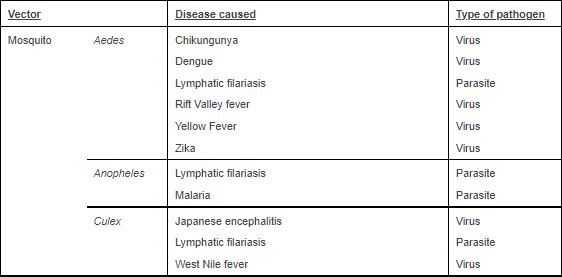Science & Technology
Genetically Modified Mosquitoes
- 23 Apr 2022
- 6 min read
For Prelims: Genetically Modified Mosquitoes, Dengue, Zika, Yellow Fever.
For Mains: Health, Diseases.
Why in News?
Recently, the US conducted an open-air study of genetically engineered mosquitoes which shows promising results.
- The aim of the study is to reduce the population of wild Aedes aegypti mosquitoes that are a vector for viruses such as chikungunya, dengue, zika and yellow fever.
- The mosquitoes had already been field-tested in Brazil, Panama, the Cayman Islands, and Malaysia, but no such study was conducted in the United States.
What are Genetically Modified Mosquitoes?
- GM mosquitoes are mass-produced in a laboratory to carry two types of genes:
- A self-limiting gene that prevents female mosquito offspring from surviving to adulthood.
- A fluorescent marker gene that glows under a special red light. This allows researchers to identify GM mosquitoes in the wild.
- GM mosquitoes produced in the laboratory lay eggs. These eggs carry the self-limiting and fluorescent marker genes.
- GM mosquito eggs that carry the self-limiting gene are released into an area. Once they have hatched and develop through to the adult stage, they are available to mate with wild females. The genes are passed on to offspring.
- The male mosquitoes have a protein (the tTAV-OX5034 protein) that prevents female offspring from surviving when male OX5034 mosquitoes mate with wild female mosquitoes.
- The female offspring die before they become adults. The expected result is that the number of Aedes aegypti mosquitoes in the area decreases.
What are the Related Concerns?
- Genetically modifying insects to control their population to curb the spread of a disease is not a novel idea. Similar efforts began a decade ago, with scientists now attempting to engineer ticks to prevent diseases.
- The concerns ranged from the modified mosquitoes harming people, its impact on mosquito-eating species and other unintended consequences such as the emergence of a deadly virus.
- Experts also believe that reducing the population of the virus-spreading mosquito is not enough to curb a potential outbreak.
Zika Virus
- Zika virus is a mosquito-borne flavivirus that was first identified in Uganda in 1947 in monkeys.
- It was later identified in humans in 1952 in Uganda and the United Republic of Tanzania. Outbreaks of Zika virus disease have been recorded in Africa, the Americas, Asia, and the Pacific.
- Zika virus disease is caused by a virus transmitted primarily by Aedes mosquitoes and can be passed from a pregnant woman to her foetus.
- Sexual transmission of Zika virus is also possible.
- There is no vaccine or medicine for Zika. Instead, the focus is on relieving symptoms and includes rest, rehydration and acetaminophen for fever and pain.
Dengue
- Dengue is transmitted by several species of mosquito within the genus Aedes.
- Symptoms include fever, headache, muscle, and joint pains, and a characteristic skin rash that is similar to measles.
- The dengue vaccine CYD-TDV or Dengvaxia has been approved in about 20 countries.
Chikungunya
- Chikungunya is caused by a mosquito-borne virus.
- It is transmitted by Aedes aegypti and Aedes albopictus mosquitoes.
- Its symptoms are characterized by abrupt fever and severe joint pain, often in hands and feet, and may include headache, muscle pain, joint swelling or rash.
- There is no specific antiviral drug treatment for chikungunya.
- There is no commercial chikungunya vaccine.
Yellow Fever
- It is an acute viral haemorrhagic disease transmitted by infected mosquitoes. The "yellow" in the name refers to the jaundice that affects some patients.
- Symptoms of yellow fever include fever, headache, jaundice, muscle pain, nausea, vomiting and fatigue.
- Yellow fever vaccine which is known as 17D and according to the World Health Organization (WHO) also, it is safe and affordable. However, there are reports of multisystem organ failure following vaccination.
UPSC Civil Services Examination, Previous Year Question
Q. Consider the following statements: (2017)
- In tropical regions, Zika virus disease is transmitted by the same mosquito that transmits dengue.
- Sexual transmission of Zika virus disease is possible.
Which of the statements given above is/are correct?
(a) 1 only
(b) 2 only
(c) Both 1 and 2
(d) Neither 1 nor 2
Ans: (c)







